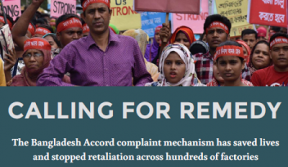We started talking about forming a union because we thought we’d lose our jobs otherwise. The first union was called Sintrapapagayo. We signed a petition to get our union officially registered and brought it to the Ministry of Social Protection. The first registration was rejected because the company was corrupt and convinced the Ministry that we didn’t have all the requirements for registration. They also fired 4 of the main union leaders.
On May 17th, we decided to form ASOPAPAGAYO and began a campaign to protest the company. The Ministry of Social Protection finally approved our union on June 27. In December we handed in our petition. At that point, the company began to discriminate against the union members and took away our benefits. The Colombian government says that we have the freedom to join unions but it really isn’t true. In January of 2009, we started our negotiation with the company and after four month of intense conversations, the negotiation ended on April 13. After negotiations, we finally won union recognition and they reimbursed all the union members for all that we had lost, such as the education and nutrition benefits and our annual raise. We also gained a small increase in our salary that will last for the next two years. In our union we’re 23 women and 3 men so I want to send the message to all the women out there who are exploited that when we fight for our rights, we can be victorious in the end.
Here’s a description of my life as a flower worker: Like many other Colombian women, I wake up at 3:30 or 4 in the morning, I prepare my breakfast and lunch for me and my kids, I get ready so I can leave at 5 in the morning for work. When I get I go home, cook, help my kids with their homework and then I go to sleep at around 9. It’s a long day without much rest. I work six days a week or 48 hours a week which is the normal Colombian workweek, and longer hours during the high seasons around Mother’s Day, for example.
In other surrounding plantations workers are forced to work until 10 or 11 at night during the high season. They are obligated to stay that late at night and there are many single mothers who have to go home to their kids, so that’s a problem. Our overtime pay is hourly – it’s about $1 more an hour. Workers often work between 10 to 14 hours a day during high season. Our President’s labor law reform made the length of the normal workday 6am to 10pm (before it was 6am to 6pm) so employers can avoid paying overtime pay to workers.
I cut about 350 stems an hour normally, but during high seasons like Mother’s Day and Valentine’s Day, they’ll have us cut even more, often 400. One of my jobs is to cut off the unnecessary buds from the plants. The supervisors yell at us for all kinds of things- if we’re not fulfilling our production quotas, if we alter the quality of the flower by cutting something the wrong way. Most flower workers get paid the minimum wage which is about $8 a day. $215 a month has to pay for food for the kids, education, healthcare and this is not enough to live off of. They price of food has also increased recently. They take out a percentage of our salary for healthcare, meals, and other things.
Flower workers often get illnesses and work injuries such as carpal tunnel syndrome. We have to disinfect the scissors every time we cut a part of the flower so that repeated movement gives us bad backs and spinal injuries. They also check on us to see if we’re using the disinfect because if we don’t use it, the flower changes color a bit. The pesticides also make people sick. They get naucious and vomit. They go to the doctor and there’s nothing that a can be done.
In other plantations where I have friends, they often tell workers they are taking out their social security payments but then they go to the doctor and it turns out they never paid into the system, so they are left with nothing to do when their kids get sick.
The women’s jobs are always harder than the men’s. They hire us because we are more delicate with the flowers and we end up doing all of the direct maintenance work with the flowers. Therefore, we’re the ones who end up getting sick more frequently. The men do post-harvest work, like throwing out the waste, and do more of the mechanical work. The men’s work is easier than the women’s. In many companies, they don’t give pregnant women light duty that they’re supposed to as mandated by the doctors. Women have lost their children because of this, including one at Papagayo. Some companies fire women who don’t want to work the long hours or pregnant women who want lighter workloads.
The supervisors harass us verbally and exploit us because they are told to by the company. It’s not their fault really because they’ll lose their job if they don’t harass us and demand so much from us because they’re harassed by their higher ups also.

